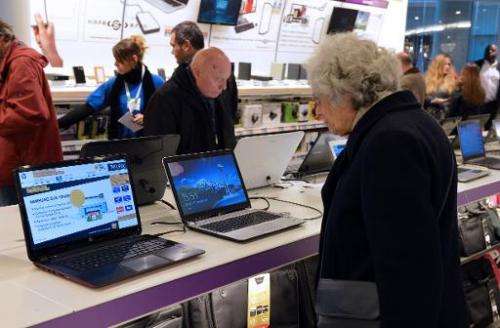US seniors see slow migration to tech, study says

American senior citizens are gradually finding their way to the Internet, but lagging the overall population in online usage, a survey showed Thursday.
The Pew Research Center report showed that 59 percent of US adults age 65 or older use the Internet—up six percentage points from a year ago. And 47 percent have a high-speed broadband connection at home.
But that leaves 41 percent who do not use the Internet at all, and 53 percent lacking high-speed connectivity, the researchers found. For the overall US population, Pew estimates 86 percent use the Internet.
"We've been reporting on tech use among older adults for more than a decade, but this particular study is unique because it was based on a large survey that allows us to look at seniors in a more detailed way than we have in the past," researcher Aaron Smith said.
"Although technology use among older adults overall remains low, there is actually quite a bit of diversity within the senior population."
The researchers found that the relatively young—under 70—affluent, and highly educated segment of this population "is actually quite connected," Smith said.
"These seniors own a fair number of technology assets, have integrated the Internet into their daily lives, and have positive attitudes towards online life."
Some 74 percent of those in the 65-69 age group used the Internet, and two-thirds of them said they had a high-speed connection.
But the percentage going online drops to 37 percent for those over 80, the survey found.
Among seniors with an annual household income of $75,000 or more, 90 percent go online; and 87 percent of those with a college degree use the Internet.
Pew said many seniors have physical conditions or health issues that make it difficult to use new technologies. Others find the technology challenging and some are skeptical about benefits.
In the survey, just one-sixth of the older adults said they would feel comfortable learning to use a new technology device such as a smartphone or tablet on their own, while 77 percent would prefer someone to help walk them through the process.
But when they get online, most seniors keep using the Internet. Among Internet-adopting seniors, 71 percent are online every day or almost every day.
In terms of other technology usage, 77 percent of US seniors said they had a mobile phone, but just 18 percent had a smartphone.
Twenty-seven percent of seniors said they had a tablet or e-reader, Pew found.
The study found 27 percent of older adults use social networking sites such as Facebook, but these users were quite active: some 81 percent of the respondents who use social networking sites say that they socialize with others either in person, online, or over the telephone on a daily or near-daily basis.
The researchers said services like Facebook were helping maintain social connections in a population with limited mobility.
Still, the percentage of seniors using social networks lagged the 63 percent of the general population.
The report is based on a survey of 6,010 adults including 1,526 over 65, taken between July 18 and September 30, 2013. The margin of error for the senior group is estimated at 2.9 percentage points.
© 2014 AFP





















